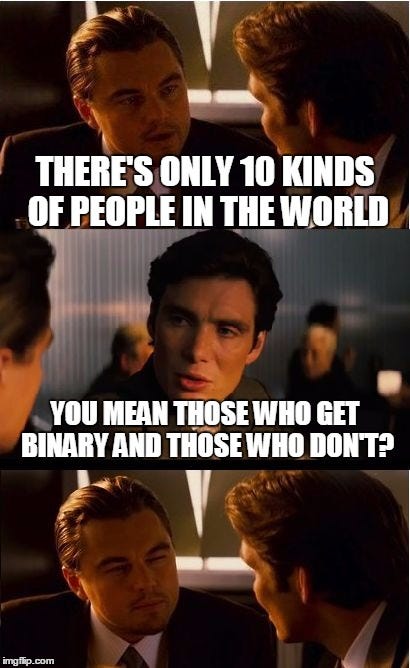I often criticize binary thinking on this blog (and elsewhere), but I also recognize that it's often useful to sort things into two categories. Indeed, I've done so with taxes, pride, billionaires, the upper class, commuters, worldviews, and much more. Each iteration was an effort to highlight an important distinction in what some incorrectly deem a homogeneous population or concept.
Today, because this blog focuses on liberty, I engage in a "two types of..." argument regarding laws. Yes, indeed, not all laws are of equal merit or morality. The enactment or existence of a law tells us nothing about whether it's a good law, whether the reason for it is fair or just or even honest, or whether we have a moral obligation to obey and defend it.
We all know that there have been unjust laws enacted in America. Slavery ranks at the top, of course, and the Jim Crow laws that descended from it also deserve high scorn. So do the laws prohibiting gay sex and interracial marriage. There are many more examples, of course.
We all also know that there are also just laws, laws that are not only morally proper but that are vital to the functioning of a society. Prohibitions against murder, violence against others, and theft are found across history and all over the world.
What makes these laws different from unjust laws?
Here's my "two types" sorting for the day:
Laws that punish the violation of others' personal and property rights are part of a free society. Laws that restrict individuals' freedoms and that prohibit adults of sound mind from engaging in behaviors that do not harm others are incompatible with the tenets of liberty, and reduce citizens to "animals in a zoo" status.
Yet all around us and every day we encounter people who justify the latter forms by arguing that, because voters voted in the people who enacted these laws, that makes them OK.
It does not. Appeal-to-law, as this behavior is sometimes labeled, is not only a logical fallacy, it is the shallowest of thinking and often a quick-and-dirty effort to justify some restriction or action that someone likes but can't defend morally.
All this came to mind upon receipt of a jury duty summons. Having gone through the process before, I expect that, should I actually get as far as screening or voir-dire, I will be asked if I believe I can follow the judge's instructions. At such a point, honesty will oblige me to inform the judge that I may not be willing to vote to convict someone for breaking a law I consider unjust. That answer will automatically earn me the scorn of the judge and prosecutors, and will almost certainly result in my not being empaneled, but it will be an honest answer and it will align with a principle of jurisprudence that far too few of my fellow citizens are even aware of:
Jury nullification.
Nullification is exactly what it sounds like, and is described by one advocacy group as:
Jury nullification occurs when a jury returns a Not Guilty verdict even though jurors believe beyond reasonable doubt that the defendant has broken the law.
In many courts, judges and lawyers are debarred from mentioning jury nullification, and in some jurisdictions, even saying those two words could get you charged with jury tampering.
The aforementioned advocacy group, the Fully Informed Jury Association, wants people to know that they can vote their consciences in a jury room, and that they are not obligated to vote "guilty" if they feel a law is unjust. Would any of us, today, vote to convict someone who helped a slave escape captivity?
Unfortunately, our system doesn't like to trust its citizens to trust their own moral compasses, and sometimes, people looking to educate their fellow humans about this matter have been prosecuted.
I don't exactly live in a bastion of ascendant libertarianism, so if I do get questioned by a judge, I will engage in a bit of discretion and ask to speak to him or her privately rather than voice my moral compass for all to hear. I will not lie, but I will not volunteer my views on nullification unless asked - and I will almost certainly not use that word. So, caveat advocatus.
The good laws in our society are rooted in the fundamentals of individual liberty and the property rights they spawn. The bad laws in our society are enacted by those who would impose their will upon the rest of us in violation of those fundamentals. We mostly choose to obey both, but not because we hold reverence for law above liberty. We do so because we will get punished if we don't. When we have the opportunity to avoid punishing someone else for breaking a law we don't think should exist, we should at least consider taking it.
A footnote, just for fun.






Malum in se vs. malum prohibitum.
There are of course other ways the juror may nullify. The prosecution may lay out a watertight case of the facts that the defendant is guilty beyond any doubt, but the juror "likes" the defendant and gives the prosecution the middle finger - not voting for conviction no matter what "the law" says. And then there's the opposite case where the prosecution presents a case that is slipshod and confusing, yet the jurors all decide they "hate" the defendant and vote for whatever the prosecutor asks. "Why not? He's probably guilty of something else, even if not this case." Voir dire is a game both sides play to the hilt. Obviously judges want jurors who will follow the law, irrespective of their personal opinions - they're not the legislature.